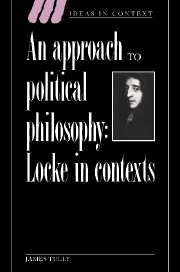Book contents
- Frontmatter
- Contents
- Acknowledgements
- Introduction
- A PHILOSOPHY OF LIMITED GOVERNMENT
- PROPERTY DISPUTES
- 2 After the Macpherson thesis
- 3 The framework of natural rights in Locke's analysis of property
- 4 Differences in the interpretation of Locke on property
- 5 Rediscovering America: the Two treatises and aboriginal rights
- GOVERNING SUBJECTS
- FREEDOM AND REVOLUTION
- Index
- Ideas in context
4 - Differences in the interpretation of Locke on property
Published online by Cambridge University Press: 20 November 2009
- Frontmatter
- Contents
- Acknowledgements
- Introduction
- A PHILOSOPHY OF LIMITED GOVERNMENT
- PROPERTY DISPUTES
- 2 After the Macpherson thesis
- 3 The framework of natural rights in Locke's analysis of property
- 4 Differences in the interpretation of Locke on property
- 5 Rediscovering America: the Two treatises and aboriginal rights
- GOVERNING SUBJECTS
- FREEDOM AND REVOLUTION
- Index
- Ideas in context
Summary
In the last twenty-five years Locke's political thought has received more and better scholarly commentary than in any other period, with the possible exception of mid-eighteenth century Scotland. I am particularly pleased that my book, A discourse on property: John Locke and his adversaries (1980), is partly responsible for the continuation of one aspect of this renaissance in Locke studies; namely, careful analyses of his explanation of property. It was very kind of the editor of The Locke newsletter, Mr Roland Hall, to invite me in 1983 to respond to the papers by T. R. Baldwin and J. Waldron and I was most grateful for the opportunity to clarify some of my arguments in the light of their comments.
Baldwin summarizes my account of Locke on property in land from the point at which good, unused land becomes scarce in the state of nature to the institution of political society and states clearly some difficulties he has with this. He then advances his own interpretation and insists – somewhat paradoxically – that it is both a version of the standard account and highly implausible.
His major difficulty consists in an apparent conflict between two theses; the first being my account, which I will now present, clarifying a few minor points in Baldwin's summary. Thesis la: When good, unused land becomes scarce in the state of nature the rule governing property in land – that everyone should have as much as he can make use of, by applying his labour without consent – no longer obtains because the enough and as good proviso is not fulfilled (36).
- Type
- Chapter
- Information
- An Approach to Political PhilosophyLocke in Contexts, pp. 118 - 136Publisher: Cambridge University PressPrint publication year: 1993

